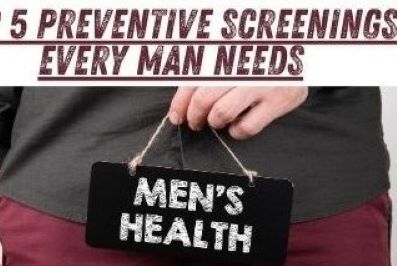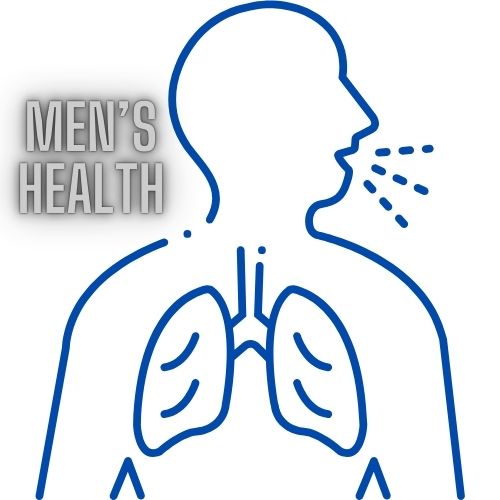You know, when it comes to health, most of us guys tend to take a more reactive approach—we wait until we feel something’s off before we get checked out. But here’s the truth: prevention is so much more effective, and sometimes a small check-up can catch things way before they become big issues. It’s like getting ahead of the game—doing a little maintenance so you don’t have to deal with the breakdowns later. So today, I want to talk about the 5 top screenings every man should consider, and why they’re so important.
1. Blood Pressure Check: The Silent Killer
Alright, let’s start with blood pressure. It’s super important, but here’s the thing most guys don’t realize: you can have high blood pressure and feel perfectly fine. That’s why it’s often called “the silent killer.” You won’t feel symptoms until things get pretty serious—like a heart attack, stroke, or kidney failure.
The problem is, high blood pressure makes your heart work harder than it should, putting a strain on it and your arteries. Over time, that damage can lead to serious issues, but catching it early with regular screenings means you can do something about it before it turns into a major problem.
The good news is, checking your blood pressure is easy and quick—it’s typically just a cuff around your arm, and boom, you’ve got your reading. If your blood pressure is high, your doctor will help you figure out whether it’s lifestyle changes, medication, or a combination that’ll work best.
When should you get it checked?
- If you’re under 40, once every 2 years if your blood pressure’s normal.
- If you’re over 40, or at risk due to lifestyle factors (like being overweight, drinking too much, or having a family history), it’s a good idea to get it checked more often.
Pro Tip:
Cutting back on alcohol, getting active, and reducing your salt intake can all help lower blood pressure naturally. Stress management (like meditation or deep breathing exercises) can also work wonders.
2. Cholesterol Screening: How’s Your Heart Really Doing?
Next up, let’s talk about cholesterol—and yeah, I know, it doesn’t sound like the most exciting topic, but hear me out. Cholesterol is a fatty substance in your blood that, in high amounts, can build up in your arteries and increase the risk of heart disease and stroke.
Now, just like blood pressure, you won’t feel high cholesterol—it doesn’t have obvious symptoms, which is why a blood test is key. The test will check your total cholesterol, as well as the breakdown between good (HDL) and bad (LDL) cholesterol, and triglycerides.
The tricky thing is, many guys don’t realize that if their bad cholesterol is high and their good cholesterol is low, they’re at a much higher risk for heart disease. The good news is that you can lower bad cholesterol with things like a healthier diet (more fiber, less saturated fat), regular exercise, and sometimes medications. If you have a family history of heart disease or diabetes, it’s especially important to keep an eye on this.
When should you get it checked?
- Start getting cholesterol checks around age 20 and get them every 4-6 years if your levels are normal.
- If you’re over 40 or have any risk factors (like smoking or being overweight), it’s best to get it checked annually or more frequently.
Pro Tip:
Eating more foods like oats, beans, avocado, and fatty fish (like salmon or mackerel) can naturally help improve your cholesterol. Plus, cutting back on processed foods and trans fats can do wonders.
3. Prostate Exam: Early Detection Can Save Lives
Okay, I know, when it comes to prostate exams, most guys will roll their eyes and try to avoid the conversation. But let’s be real: prostate cancer is one of the most common cancers in men, and it can often be treated if caught early. So, getting a PSA test (Prostate-Specific Antigen) or a digital rectal exam (DRE) is just something you should add to your health check-up routine.
A PSA test measures the level of prostate-specific antigen in your blood. Elevated levels can sometimes indicate a problem with the prostate, such as prostate cancer, benign prostate enlargement, or infection. If there are any concerns, your doctor may recommend further testing.
The thing with prostate cancer is that early-stage prostate cancer often doesn’t have noticeable symptoms, which is why regular screenings are critical. Catching it early means it’s much easier to treat, and survival rates are much higher.
When should you start?
- If you’re 50+, it’s a good idea to start getting screened annually.
- If you’re at higher risk (e.g., African American men or have a family history), start at age 40 or 45.
Pro Tip:
Don’t skip this exam just because it feels awkward. Trust me, the small discomfort is nothing compared to the peace of mind you’ll get, knowing you’re on top of it.
4. Diabetes Screening: Know Your Blood Sugar Levels
Let’s move on to diabetes. We’ve all heard of Type 2 diabetes, but the scary thing is that many guys have it and don’t even know it. Diabetes can mess with your body’s ability to process sugar (glucose), and it often leads to complications like kidney disease, nerve damage, and cardiovascular issues.
If your blood sugar levels are too high, but not yet in the “diabetic” range, you’re considered prediabetic—and that’s a warning sign that you need to make some lifestyle changes to prevent the condition from progressing.
You can get a simple blood test, called the A1C test, which measures your average blood sugar levels over the past 2-3 months. If you’re at risk—because of family history, excess weight, or lack of exercise—this test is key to understanding how well your body is managing sugar.
When should you get it checked?
- If you’re over 45, it’s a good idea to get checked every 3 years.
- If you’re overweight, have high blood pressure, or have a family history of diabetes, you may need it more often.
Pro Tip:
Even if you’re prediabetic, losing weight, eating healthier (hello, vegetables!), and moving more can help bring your blood sugar back to normal levels. Don’t wait to take action!
5. Skin Check: Protect Your Skin, Protect Your Health
Finally, skin cancer—we can’t leave this one out. Skin cancer is the most common type of cancer in the U.S., but the great thing is that it’s also one of the most preventable cancers if caught early. Regular skin checks can help detect changes in moles or the appearance of new spots, which might indicate melanoma, the most dangerous form of skin cancer.
Men are especially at risk for skin cancer because we tend to spend a lot of time outdoors, whether it’s from working outside, playing sports, or just not being as diligent about wearing sunscreen. The key is to catch any abnormal growths early, so having a dermatologist check your skin regularly is a great idea.
When should you get checked?
- Once a year, especially if you have a history of sunburns or have a fair skin type.
- If you notice any new moles, changes in color or size, or irregular borders on your skin, get it checked right away.
Pro Tip:
Wear sunscreen (yes, every day!) to protect your skin from UV rays, and if you’re spending long periods in the sun, wear protective clothing, hats, and sunglasses. It’s never too late to start taking care of your skin.
So, yeah, that’s the rundown. These 5 screenings—blood pressure, cholesterol, prostate exam, diabetes check, and skin check—are simple, non-invasive ways to stay ahead of any health issues that may pop up as you get older. Sure, they might seem like things you can put off or avoid, but the reality is, getting checked now could save you from way more serious problems down the road.
It’s all about being proactive with your health—taking that small amount of time now to avoid a huge problem later. If you haven’t had one of these screenings recently, make sure you schedule them with your doctor. Trust me, you’ll feel so much better knowing you’re on top of it. Health isn’t just about looking good; it’s about feeling good and living long, too.
So, have you had any of these screenings recently? If not, maybe it’s time to make the appointment. You’ve got this!







